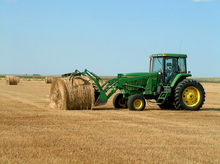The Humane Society of Huron Valley is seeing an increase in the number of cruelty calls about hungry horses, spurred in part by a nationwide shortage of hay.

Nationwide shortage of hay
Horse owners are digging into their winter supplies of hay months early as scarce supply gets snatched up at auction by people from out of state, leaving hungry horses and cash-strapped owners.
And for the first time in its history, the HSHV has three horses it is trying to find homes for, said Matt Schaecher, the organization's cruelty investigation director.
"People are running into hard times feeding their animals," Schaecher said. The shelter is dealing with a dozen horse cruelty cases and is trying to set up a farm animal aid fund to help owners keep their stock through donations of hay.
The three horses looking for new homes are Queenie, part quarter horse; Sugar, an Arabian horse, and Turner, a thoroughbred. They were confiscated in mid-July from two owners who weren't taking proper care of them. Nearly three months later, Queenie and Sugar have more or less recovered. But Turner, a larger horse, still needs to put on weight. Caring for them has cost thousands of dollars, Schaecher said.
"They look amazing," cruelty investigator Michele Baxter said of the horses, which she described as skin and bones and covered with rot when they were picked up.
The worst may be yet to come, said farmers and livestock owners. Horse owners are digging into their winter supplies of hay months early. And prices have tripled and quadrupled, as scarce supply gets snatched up at auction by people from out of state.
The average horse eats about a half bale of hay per day, said Jodi Louth of the Michigan Horse Welfare Coalition's hay bank. Since the beginning of 2012, the organization has fielded requests to help 115 equines, and requests for assistance have increased. Schaecher, who also is a Detroit firefighter, said the group sees bales costing around $10 when they are normally $3 or $4.
Many of the cruelty cases at HSHV are from people who aren't intentionally cruel, but who simply can't care for their animals anymore.
"Now we're faced with the care of over a dozen of them," he said. "So, we're trying to set up a program to help the general public."
Sharon Windsor, president of Turning Pointe Donkey Rescue in Dansville, about halfway between Jackson and Lansing, grows hay on her sanctuary to feed her donkeys and to sell to nearby farmers. Her first crop of the year yielded good numbers, she said.
Then the heat and lack of rain nearly wiped out her second crop and forced livestock owners into the market to buy $9 bales of hay. She predicted a second harvest of 300 bales if she's lucky. Normally, she'll pull up to 800 bales.
"It's absurd," she said. "You're either going to pay the light bill or feed your horse."
Mike Lickey, co-owner of Destiny Farms in Brighton, said he has seen bales go for up to $17 per piece at auction, and laments the plight of both hay farmers and hay users. The farmer charges more to make up for the lost crop, and the users can't afford those prices. Larger-scale operations have come in from Texas and Indiana, where the shortage is also an issue, and bought huge swathes of Michigan hay. Then there's nothing left for the smaller-scale farmers.
"I feel sad for anyone who's got horses," Lickey said. "About 15 people we know have gotten rid of them all."
